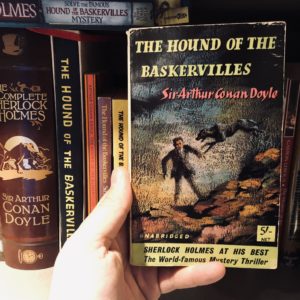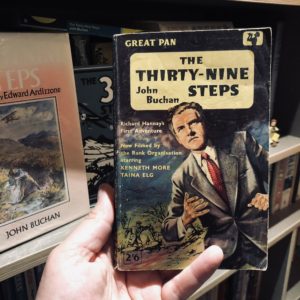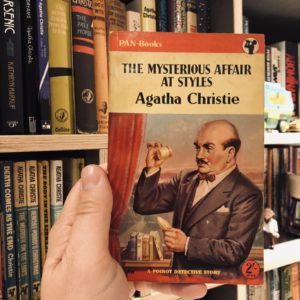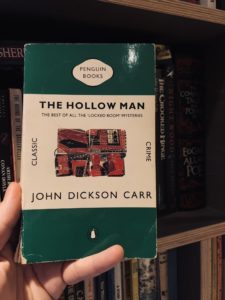Decades: Compiling the Ultimate Library with David Monteath
The second quarter of 2022 is upon us. As this latest Decades selection goes live it will be April and Decades will be in its sixteenth month of guests. I am grateful to each and every contributor and to you for returning, week on week, to see the latest books which are being added to my Decades Library.
The Decades Library I hear you ask? I am compiling a list of the very best books which my guests think would deserve a place in the Ulitmate Library. I started this project in January 2021 with zero books and each week I ask a guest to nominate five new books which they would want to see included in a collection of the finest writing.
When making their selections my guests are asked to follow two rules.
1 – Choose Any Five Books
2 – You May Only Select One Book Per Decade From Five Consecutive Decades.
This week I am delighted to be joined my someone who reads my books for me. Or is that to me? David Monteath (@joxvox) will be a familiar voice to many audiobook fans and I am always fascinated to know which books stand out to someone who spends most of his waking hours focused entirely on the written word.
 One of Scotland’s most popular voiceovers, David Monteath was born in Glasgow and started acting while at high school, he trained as an actor at Webber Douglas in London and has been an actor and voiceover for 25 years.
One of Scotland’s most popular voiceovers, David Monteath was born in Glasgow and started acting while at high school, he trained as an actor at Webber Douglas in London and has been an actor and voiceover for 25 years.
David’s early life was split between homes on the outskirts of Glasgow and the beautiful Spey Valley in the Highlands of Scotland. He also lived in central Perthshire near the popular tourist destination of Pitlochry with its world-famous Festival Theatre.
While training at the prestigious Webber Douglas Academy in London, David met his future wife Lindsay. They have three children and all five of them have worked as voiceovers for clients across Europe, Asia, North America and the Middle East.
David has put his voice to good use over the years and has vast experience of most aspects of being a voiceover from advertising for television and radio, ADR and dubbing on film and television, language tapes for learners of English, telephony and on-hold messages, character animation through to narration, commentary and audiobooks.
He has also produced and co-presented a weekly request show on Stoke Mandeville Hospital Radio
DECADES
Most of my choices are made from books I have read for work, one of the downside of being an audiobook narrator is that I rarely have time now to read for pleasure, so in many ways my reading choices are dictated by my clients. Not that this is necessarily a bad thing, this work has introduced me to many writers I would never have found otherwise.
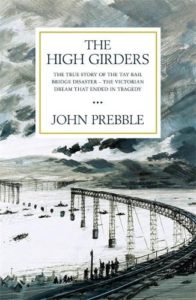 The High Girders – John Prebble – 1956
The High Girders – John Prebble – 1956
This is an absolute classic and the first John Prebble I have read. It follows the story of the building of the Tay Railway bridge and its eventual collapse on 28th December 1879. The story follows in detail the events of the night, and wherever the blame is felt to lie for the errors which caused the disaster and 75 deaths, Prebble’s book is a fascinating account of a terrible night and a compassionate recounting of so many very human losses.
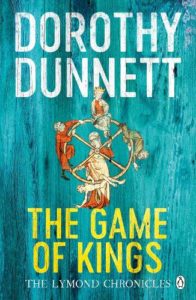 The Game of Kings (The Lymond Chronicles) Dorothy Dunnett – 1961
The Game of Kings (The Lymond Chronicles) Dorothy Dunnett – 1961
Ok, there is a tale behind this one…where else would tails be?…I was recording a quiet story of a country doctor when the producer asked if I would be interested in narrating another book for him, ‘it’s a bit longer than this one’ he said. ‘Of course I would.’ Now cut forward a few days and I was sent the pdf, most audiobook narrators work from iPads, it makes it much quieter as you don’t hear the dreaded page-turn noises that audio editors hate. Also making notes on character and scene etc are simpler on a screen. So, I opened the pdf and found a place at random a good few pages in. I read a rather lovely scene between our hero Lymond and a very young Mary Queen of Scots, set on an island in the middle of the Lake of Menteith, my area of Scotland…but more importantly where I was married. Of course I was completely drawn in and contacted the producer who said…’Um, this has changed slightly, you might have noticed that the book is a biggie, we think it’ll be around 26 hours when you’ve finished recording. Is that still ok?’. Oh definitely good for me. Then he muttered quietly as the phone was going down…’just one more thing…there are six of them, all pretty much the same length!!’ So, this quiet chat turned into 1.3 million words read, 146 hours of finished audiobooks and over 300 hours recording in my tiny studio during the very hot summer of 2018…it was HUGE…and I would do it all again in a heartbeat.
I’m not going to try to precis the book or the series, if you’ve read or listened to them you know why…if you haven’t, the please, please do, you absolutely wont regret it. They are glorious.
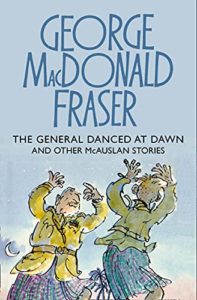 The General Danced at Dawn – George MacDonald Fraser – 1970
The General Danced at Dawn – George MacDonald Fraser – 1970
IN the early 1990s, when I was on tour with the Oscar Wilde play ‘A Woman of No Importance’, I shared dressing rooms around the country with an actor called Stuart Hutchison, who was also a regular face on Westward Television in the Plymouth area. Stuart and I spent hours talking about books, art, music and pretty much anything but football which we both dislike. He bought me a copy of The General Danced at Dawn as I’d never read the stories and he wanted someone else to be able to laugh at them and love them as much as he did. I’ve been very fortunte in my career to work with some really kind, generous people and that was Stuart.
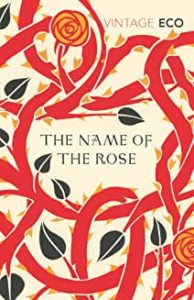 The Name of the Rose – Umberto Eco – 1980
The Name of the Rose – Umberto Eco – 1980
Hmmm, I’m beginning to sense a bit of a history theme in my reading. This book sort of crosses all of my working genres, history (albeit fictional) and crime. It’s a complicated disturbing romp through murders in a 16th Century monastry in middle Europe, probably modern day Germany. The descriptions of ecclesiastical life and the conflicts in the church at that time are great, although if you saw the film first, I defy you not to hear Sean Connery every time Brother William speaks.
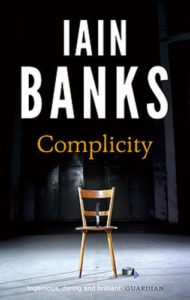 Iain Banks – Complicity – 1993
Iain Banks – Complicity – 1993
Right then, back to me again…this is a revenge story, brilliantly written by the always brilliant Iain Banks. Someone once asked me, if given a choice what books would you like to have narrated? Any of the Iain Banks would have been my choice. It’s even more annoying that the reader is a friend and a very good reader.
I worked in a bookshop in the early 1990’s and without exception all these authors were selling in great numbers in Inverness bookshops – I know this as I was selling them. Pure nostalgia for me and I loved these choices.
And not just those choices as David gave me two extras. I have taken an executive decision to move Montrose out of the 1970s and Morningstar out of the 1990s selections. I don’t mind the fact Montrose was originally written in the 1920s but it would mean dropping George MacDonald Fraser so rather than flex the rules I opted for the clear cut entry. I am being hard on David Gemmell by moving him to the subs bench but only one book per decade is the rule so I flipped a coin!
But I don’t hide the alternates so here are David’s thoughts:
Montrose – John Buchan – 1979 (from 1928)?
This might be a bit of a cheeky one as the book was originally published in 1928, but reissued in 1979. This was another audiobook project, but one far closer to my heart. My clan are the Graham from Stirlingshire and this book tells the story of the first James Graham, 1st Duke of Montrose. My father was passionately interested in Scottish history, so this exploration of a turbulent time in Scotland was a particular favourite of his.
Morningstar – David Gemmell – 1992
OK, yes, actually I just like a good historical epic, this one was a thumping good read, glorious descriptions and a suitably complicated fantasy world. Its beautifully written and a great adventure.
A country in desperate need of heroes . . .
Angostin invaders surge through the Highlands, laying waste to everything in their path. Darkness follows in their wake as a mad necromancer resurrects the eons-dead Vampyre Kings.
Only the bandit Jarek Mace, and the magicker and bard Owen Odell, have the courage to fight the Angostins and the undead. Whispers soon spread that Mace is the legendary Morningstar, a saviour who will protect his country in its hour of need. Yet Mace seems nothing more than a thief and a liar.
As the final battle approaches, Odell wonders which of the two Maces will triumph: the self-serving rogue or the saviour of his people, the Morningstar.
DECADES WILL RETURN


